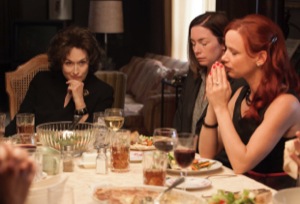
August: Osage County
In 2008, Tracy Letts’ three-and-a-half hour comic tragedy August: Osage County won the Pulitzer Prize and the Tony Award for Best Play, and it was considered one of the theatrical events of the first decade of the century. Transforming the play into a film was a no-brainer, but whittling three-and-a-half hours to a more cinematically appropriate two and recasting box office draws is not a no-brainer; it’s hard. And for some reason, the great TV producer John Wells, who had never directed a film before and certainly not such a prestige picture, was picked to helm this process. I’m not sure if anyone could have successfully made the transition (except maybe Mike Nichols), but Wells was clearly overwhelmed by the task of working with Letts’ adaptation and a nearly pyrotechnic cast.
The movie is a searing, funny potboiler, but if you’ve never seen the play (as I have not), it’s hard to imagine how this movie could have come from one of the great dramas of recent memory.
In the heat of August in Oklahoma, the poet patriarch of the Weston family Beverly (Sam Shepard) goes missing and his children and their spouses come to the house to help their cancer-ridden, drug-addled mother Violet (Meryl Streep). There are three daughters, bitter Barbara (Julia Roberts), who moved away with her husband Bill (Ewan McGregor); put-upon Ivy, who stayed (Julianne Nicholson); and seemingly shallow Karen (Juliet Lewis), who also left Oklahoma, but unlike Barbara was not missed. Violet’s loud, busy sister Mattie (Margo Martindale) and her kind, slow-spoken husband Charlie (Chris Cooper) also come, and eventually so does their son, the supposed loser Little Charles (Benedict Cumberbatch).
This is an angry, damaged, and extremely dysfunctional family, and after Beverly is found dead, the festering conflicts explode: Barbara and Bill are separated and everyone finds out; their daughter Jean (Abigail Breslin) is sullen and precocious; Ivy and Little Charles are having a secret affair; Karen had brought her fiancé, the caddish Steve (Dermot Mulroney); Mattie and Charlie are failing to hold it all together; Violet is angry at all of them, particularly Barbara and Beverly, and she has no filter, no control, a lot of cigarettes, Jackie O sunglasses and a fabulous wig.
As these characters tumble toward a series of rather astonishing, rather appalling and narratively unearned climaxes, it’s easy to see why all of these actors signed up for the movie. Every role is juicy, full of dark emotions and caustic words, and they all seem to be having a good time. All except for Julianne Nicholson, who plays perhaps the only true tragic figure in the story, and her subtlety and control and perpetual sadness make her work quite remarkable up against, particularly, Roberts and Streep. Roberts does some of her best work as Barbara, even if it is as caustic as anything she’s ever done. Barbara is not a happy woman.
This is not surprising considering her mother is Violet, who is part Cruella de Vil, part Martha from Who’s Afraid of Virginia Woolf, part Mommie Dearest. While she was nominated for a Golden Globe, along with Roberts, Streep’s performance as Violet is one of her worst. She’s uncharacteristically unhinged, chewing up her children and the scenery, ranting and raving with much more energy than a dying sedative addict would have. With Violet as the heart of the film, Wells’ direction of Streep should have been much more restrained and believable. But instead, Streep is personified chaos. I can see the reasoning behind that choice, since the Westons are a hurricane.











